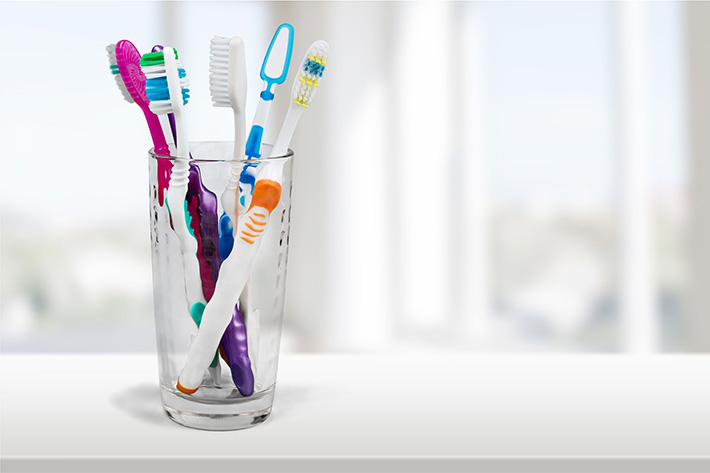The toothbrush is a very old tool. In 3500 BC, the Babylonians and Egyptians used chewing sticks, similar to a modern toothbrush, to clean their teeth.1 The Chinese added bristles to the toothbrush during the Tang dynasty (619 to 907 AD) and by 1885, American companies were mass producing toothbrushes with boar bristles and bone, ivory or wood handles.
A toothbrush is one of the best tools you have to protect your teeth and safeguard your oral health.
Most people don’t realize, however that there are important things to know about a toothbrush that can help keep your teeth and gums in the best shape possible, including how a toothbrush should fit your mouth, how soft or hard it should be, how often you should use your toothbrush, and how often you should get a new toothbrush.
What is the Best Toothbrush Size?
When shopping for a toothbrush, how the brush fits is an important consideration. While you can’t try out a toothbrush and take it back if it’s the wrong size, given the relatively inexpensive cost of a toothbrush, you won’t go broke by selecting and buying several sizes and trying them out.
The head of the toothbrush should easily fit into your mouth and you should be able to brush one to two teeth at a time.2 The average size toothbrush head for adults to easily access all surfaces of their teeth is a brush head that is one-inch long, a half-inch wide and one-inch tall.
When selecting the right size toothbrush head, make sure that you can easily access and clean hard-to-reach spots like the sides and back of your molars.3 Other hard-to-reach spots include the insides of your lower and upper front teeth. These spots are susceptible to tartar buildup because many people can’t adequately clean in these areas. Sometimes a specialized type of brush head, like an angled or compact brush head, can be helpful in reaching these spots. Adults with small mouths often prefer compact brush heads or even youth or child-sized toothbrushes so they are able to brush behind the back teeth.
Hard of Soft Bristles?
While you might think that a hard bristled toothbrush cleans better than a soft bristle brush, if you brush your teeth too vigorously with a hard bristled brush you can actually damage the gums, root surface and protective tooth enamel.4 Because of this danger, experts recommend that most people select a soft-bristled toothbrush. If you want to be even more cautious, select a toothbrush that has rounded tips on the bristles.
How Often Should You Use Your Toothbrush?
Like any tool, a toothbrush isn’t helpful if you don’t use it. The American Dental Association recommends that you brush your teeth at least twice a day for a minimum of two minutes using an ADA-accepted fluoride toothpaste.5 They further recommend that you clean between the teeth each day by using dental floss and that you use a fluoride mouth rinse each day. Eating right and seeing your dentist regularly is also part of their recommendation for good oral hygiene.
How Often Should You Replace Your Toothbrush?
Replacing your toothbrush at the proper interval is very important to maintaining good oral health. If your toothbrush bristles look worn, frayed, or splayed outward, it’s time to get a new toothbrush. The rule of thumb is that manual toothbrushes or electric toothbrush heads should be replaced when you see signs of wear or at a minimum of every three months.
Clinical research on flat trim manual toothbrushes has revealed that a new toothbrush can remove up to 30 percent more plaque than one that is three months old.6 If you have been ill, replace your toothbrush right away to prevent reinfection.
If you aren’t sure of the best toothbrush for you, don’t hesitate to talk to your dentist. They are familiar with your individual dental health history so they are the best source of expert advice to help you maintain a beautiful and healthy smile.
Dental health is important and is easy to keep in check with proper oral health habits such as brushing and regular visits to the dentist for cleanings. Having a healthy mouth can improve your quality of life and overall health. Let our Walled Lake dental practice help! Dr. Hechtman has been providing dental care for over 40 years and offers a full range of services including dental treatments and cosmetic dentistry. Our goal at Walled Lake Dentistry is to work with our patients in achieving and maintaining long term dental health and a beautiful smile. Call us today at 248-669-5221 and get started on healthy mouth and smile!
___________________________
1 The History of the Toothbrush by Melissa Bell, 3/28/2018
Link: https://www.thehealthsciencejournal.com/the-history-of-the-toothbrush/
2 How to Select a Toothbrush, www.dentaldentalins.com
Link: https://www.deltadentalins.com/oral_health/select_toothbrush.html
3, 4 Choosing a Toothbrush: The Pros and Cons of Electric and Disposable
Link: https://www.webmd.com/oral-health/guide/choosing-a-toothbrush-the-pros-and-cons-of-electric-and-disposable#1
5 Brushing Your Teeth
Link: https://www.mouthhealthy.org/en/az-topics/b/brushing-your-teeth
6 Types of Toothbrushes – Choose the Right Brush for You, www.oralb.com
Link: https://oralb.com/en-us/oral-health/why-oral-b/electric-toothbrushes/types-of-toothbrushes/
